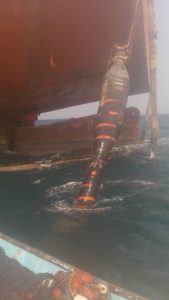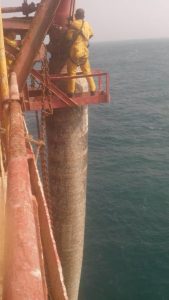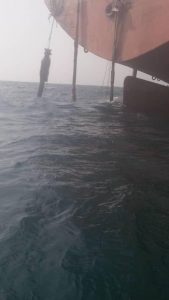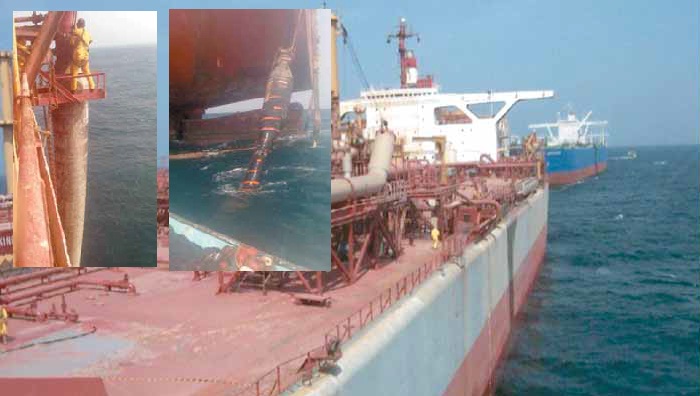A Massive Catastrophe That Will Impact The World If This Floating Bomb Explodes-Report
YemenExtra
M.A.
The official Al-Thawra newspaper in the capital Sana’a has issued urgent warnings of an impending global disaster in the Red Sea.
The newspaper reported in an extensive report that the crisis of decaying Safer oil tanker floating in the port of Ras Issa is in danger of exploding if it will be left to collapse or even explode.
The report said that the mercenaries affiliated with the Saudi aggression are following false pretexts of bidding and the aim of blackmail, not to search for a solution that would prevent the imminent global economic and environmental catastrophe.
To summarize the report:
The coalition of aggression and its mercenaries continue to impose a siege on the tanker and are preventing the export of about one million and two hundred thousand barrels of oil stored inside it since 2015, or allow the arrival of fuel oil needed to operate the generators of boilers and coolers of the floating tanker facility or the arrival of maintenance teams in order to prevent the risk of explosion or leakage of oil that could occur at any moment.
Warnings of the danger of leakage of oil from the tanker or the explosion of the reservoir and its catastrophic environmental and economic consequences on the Red Sea and the surrounding states are not new and have been launched by the prominent figure of the Supreme Political Council and the Government of Salvation for three years. However, this time, it came from the Yemeni government backed by Riyadh, days after the sale of a new shipment of Hadramaut oil.
The government of the mercenaries that is backed by Riyadh claims that the authority of the political council and the government of salvation prevents the export of the oil from the floating tanker and the arrival of maintenance teams to it, at a time when the facts confirm in documents that those who prevent the export of oil and the arrival of the maintenance teams is the Saudi-led aggression and their mercenaries.

ِ
A floating port
Established in 1976, the Safer ship (FSO) is a large oil tanker with a built-in weight of 409,000 metric tons and a capacity of about 3 million barrels of oil. Owned by SEPOC for the first time in 1986, and later became the world’s third-largest floating port for oil storage and exporting to the world.
In 1988, SEPOC established the ship permanently off the Ras Essa oil port, 4.8 miles offshore (8 km) from the Yemeni coast on the Red Sea, and connected it to the 430 km oil export pipeline from Marib, With equipment allowing the transfer of crude oil to other ships for exporting purposes.
The Safer tanker, the main export terminal for light crude oil extracted from Sector 18 in the Safer region of Marib and Sector 9 in Malik, Shabwa governorate, was stopped before pumping stopped as a result of the US-supported Saudi aggression on March 2015.
Since March 2015, the Safer ship has been carrying out quantities of crude oil ready for export, estimated at more than one million and 200,000 barrels of crude oil, that couldn’t be exported for the past four years due to the siege of the Saudi-US aggression coalition. Also, the employees in the ship were evacuated and the scheduled maintenance work stopped, and it used to cost $ 10 million a year.

Causes of the crisis
What exacerbates local, regional and international concerns about the remaining of oil in the ship, according to a report issued by the Sanaa Center for Studies in mid-June, “the generators on the ship have stopped operating due to diesel shortages, meaning they are no longer able to pump crude gas into the amount of oil Stockpiled, and likely to burst its accumulations .
Since November 2016, the Saudi-American aggression alliance has prevented Yemen from supplying the Safer (floating oil tanker) with diesel oil to operate generators of cooling and discharging gas from the crude oil. The Saudi coalition blocked the (Rama 1) vessel and prevented it from entering the territorial and local waters off Yemen to unload 3000 tons of the substance of the oil in the Safer tanker.
This is confirmed by a letter submitted by Middle East Shipping Company to Yemen Oil Company on 7 November 2016 that states :”the coalition forces refused to allow the Rama 1 to enter the territorial waters of Yemen to unload the amount of 3000 tons of fuel oil in Safer despite obtaining the permission of the United Nations.” As a result, Safer launched the first warning.”
Steam boilers operating with diesel fuel form the heart of the floating tanker, without them, all activities stop and the tanker just becomes useless.
Safer explained the importance of the diesel to the floating tanker, saying: “The generation of electricity in the ship is done through the steam turbines. Also, the desalinated water from the sea also depends on the steam turbines; therefore, producing steam is a must within the tanker and its availability depends on the fuel in order to run the boiler. The Safer company emphasized that supplying the ship with diesel is “the only solution to save the situation.”
The company warns that if the tanker is not supplied with fuel soon, there is an expectation of a fire or explosion in the ship that will lead to unprecedented sea pollution in the Red Sea and will pose a challenge to Yemen and the region,” the company stressed. In addition, the company clears its responsibility for what may be caused by the depletion of the floating tanker or the leakage of oil from it.

Subsequent warnings
The General Authority for Maritime Affairs issued a letter on November 9, 2016 confirming “the need for the Safer floating tanker of fuel oil to restart it and carry out the necessary maintenance work to avoid the occurrence of large pollution due to the leakage of oil to the sea, leading to a major environmental disaster.” Citing the consequences of “the suspension of the ship for more than 18 months.”
On December 21, 2016, the Minister of Oil and Minerals met with the Government of Salvation, then the leaders of the oil bodies and institutions. He stressed the need to take actions that will prevent the tanker from creating catastrophic effects due to its aging and the stop of its maintenance work to the Siege imposed by the Saudi aggressive coalition.
“The stopping of most activities, including maintenance on the floating tanker, threatens a maritime disaster that will affect Yemen and neighboring countries,” the Maritime Affairs Authority said in April 2017. The director Mohammed Matouk said that «putting the Safer ship under the targeting by the Saudi coalition of aggression reflects one image of the large blackmail that is exposed to Yemen».
“We are talking about a huge floating tanker that entered service in Yemen 30 years ago and the quantity that this tank contains is massive. In the event of an explosion or fire, the environmental disaster may hit a number of people,” Maatouk said in a press statement. He added that it will also cause serious consequences and for a period of time, and the problem will not be immediate.
“On May 6, 2017, the Minister of Oil and Minerals warned of “an imminent environmental disaster in the Red Sea caused by an oil spill from the floating tanker.” The coalition of the Saudi-American aggression bears the full responsibility for not allowing the export of oil in the reservoir and preventing the supply of diesel fuel that is necessary for operating and maintaining the tanker and to protect it from corrosion ».
Consecutive appeals
Accompanied by appeals of the authority of the Political Council and the Government of the Salvation, with appeals to the United Nations, including the meeting of the Deputy Prime Minister and the Ministers of Oil, Finance, Electricity, Energy and Civil Service, was devoted on 13 October 2018 to review «aspects of comprehension with the United Nations regarding the Safer tanker and the importance of unloading crude oil from it after no maintenance work was accomplished for nearly four years ».
While renewing the meeting «warning that any leakage from the vessel will harm the areas located in the Red Sea and the surrounding marine environment, which will put the entire region at risk of exposure to the largest environmental pollution disaster», The Foreign Minister Hisham Sharaf handed over on 4 November 2018, to the United Nations Resident Coordinator in Sana’a Liz Grande), a message to the Secretary-General of the United Nations (Antonio Guterres).
The letter included an offer of an initiative to the United Nations and the demand for pressure to “allow the use of fuel in the ship” Safer “in Ras Issa to generate electricity for the Yemeni cities and contribute to the alleviation of humanitarian conditions and avoid the environmental disaster that may cause any leakage from the tanker as a result of the deprivation o maintenance to the ship by the Saudi aggression».
On November 13, 2018, an important statement was issued by the Ministry of Oil and Minerals calling for “the United Nations to play its role in protecting the ship sailed on the Red Sea coast, from any targeting by the countries of the coalition of aggression.” The statement stressed that « the targeting will lead to a disaster on the national economy and the marine environment in Yemen and the whole region that could extend in the event of leakage of oil from the tanker from Bab al-Mandab to the Suez Canal».
The Supreme Political Council of Yemen
The same warning was also spoken by the Supreme Political Council in a direct language through a member of the Council, Mohamed Ali al-Houthi, declaring the problem to be exacerbated. He said in a tweet on Twitter on April 22, 2019: “The sales, Of crude oil within the Safer tanker, has been halted by the US-British-Saudi-Emirati aggression and their coalition since 2015 to this very day».
The member of the Political Council held the United States and the Saudi regime. along with their aggressive coalition, responsible for the disastrous effects that may affect the environment and maritime navigation due to the disruption of the Cape of the ship Safer, which contains about one million barrels of crude oil. Saying: We hold the countries of aggression responsible for any damage that may affect the marine environment or navigation, which will cause a disaster for the world ». However, the aggressive coalition ignored the warning.
Still, the Ministry of Oil and Minerals in the Government of Salvation, through a statement issued on May 5, 2019, called on the United Nations and international organizations to intervene to prevent the countries of aggression from targeting the ship Safer and allow the sale of crude oil located inside it to benefit from the income in the establishment of alternative oil reservoirs because the ship became dilapidated and Maintenance is suspended due to Saudi-led aggression, which threatens an environmental disaster in the region.
On June 11, 2019, Foreign Minister Hisham Sharaf handed over a letter from the President of the Supreme Political Council (Mahdi al-Mashat) to the Secretary-General of the United Nations (Antonio Guterres) and a number of Presidents in several countries, Statements and statistics of the crimes committed by the US-back Saudi-led aggression, and warnings of catastrophic consequences if there is a delay in dealing with the Safer tanker.
Neglected initiatives
Meanwhile, the political council and the government of Salvation offered solutions to the crisis of the Safer floating tanker. The former president of the political council, martyr president Saleh al-Sammad, revealed in an interview with Al-Mayadeen Arabic channel in early 2017 that “the United Nations did not play a role in this context and it failed to allow the export of this quantity so that the gains from the selling can be used to buy vital medicines needed by the Yemeni people in this difficult period.
On December 4, 2018, Foreign Minister Hisham Sharaf presented an initiative to the United Nations Secretary-General (Antonio Guterres) to pressure the United Nations to “allow the use of fuel on the ship “Safer” in Ras Essa to generate electricity for Yemeni cities to facilitate the humanitarian situation and avoid the environmental disaster that may be caused by any leakage of the dilapidated tank.
On May 1, 2019, political council member Mohamed Ali al-Houthi launched a new initiative. He said in a tweet on Twitter: “We call on the United Nations and the Security Council to put in place a mechanism based on the sale of Yemeni crude oil in the Safer tanker and in return, get petrol, Diesel and domestic gas available because they are necessary materials for citizens, and the return of what is sold goes to the banks of Sana’a and Aden to pay the salaries of employees under their control.
However, the initiative was rejected by the Saudi-backed government that is located and operating from the Saudi capital of Riyadh, which claims that the concept of the Swedish agreement states that the Yemeni army and the popular committees must withdraw from Hodeidah and its ports, including Ras Issa. Then, they handed it over to them to “export oil and receive its revenues to finance state expenses, including salaries.” As it claims, although this did not happen with the revenues of oil and gas in areas under the control of the Saudi-led aggression and its mercenaries, where most of Yemen’s oil and gas are found.
Serious risks
The intransigence of the Saudi-American aggression and the escalation of its mercenaries militarily have exacerbated the upcoming dangers that as a result of not supplying the tanker with fuel needed to operate its generators. Also, the prevention of the export of its oil content, which warns international reports that if it leaks, ” It will cover an area of 939 trillion square meters,” which means that the effects of the environmental disaster will exceed the Red Sea and extends to the neighboring seas.
The study center of Atlantic City in the US, issued warnings in mid-April, saying: The ship “turned into a huge bomb that can explode due to its contents and lack of maintenance.” Stressing that «the risk of the explosion is increasing as each day passes». “If this happens, it will not only damage or sink any ships in the vicinity; it will also lead to an environmental crisis nearly four times the size of the oil leak in Exxon Valdez, 1989.
In May 2018, The Conflict and Environment Observatory also issued similar warnings in the context of presenting comprehensive details on the ongoing ship and its continuous deterioration, highlighting the environmental concerns of the leak due to the closure of the Safer station since the beginning of the war and its maintenance. Moreover, it stressed the possibility of an explosion. Therefore, an American report by the «The Atlantic Council» study center emphasized, «the must of injecting the inert gases in the air to make sure that the oxygen does not exceed this level of concentration».
The US report confirmed that this could not “make the tank flammable and an effective giant bomb.”The wrong spark or bullet could trigger a devastating explosion of the facility and the pipeline, causing destruction in the marine environment, and in addition to potential human casualties, it would certainly contribute to an economic and humanitarian crisis,” the report added. “If immediate action is not taken to neutralize the bomb, the world economy may experience a significant disruption in the flow of maritime trade.”
Not only that, but the catastrophic effects of the flooding or explosion of the floating Safer tanker, according to the Study Center for Atlantic Studies, also has tragic humanitarian consequences. “The Yemeni people may face the worst famine in more than a century. The report stressed that the impact would not only be regional but will reach the world, as it stated: “The world may lose, among other consequences, every major area of marine biodiversity.
Interventions are required
The main constant point is that an urgent and serious intervention is a must to solve the problem, the crisis and avoid the disaster, which does not appear to be available in the coalition of the Saudi-American aggression and its mercenaries. This is because their efforts show a more tighten siege on the areas that are not under their control, and disregard for any humanitarian or economic or environmental consequences and this is evidenced by the course of the aggression for four and a half years, in which the interest of the Yemenis was always abandoned.
This report originally ran on Yamanyoon

